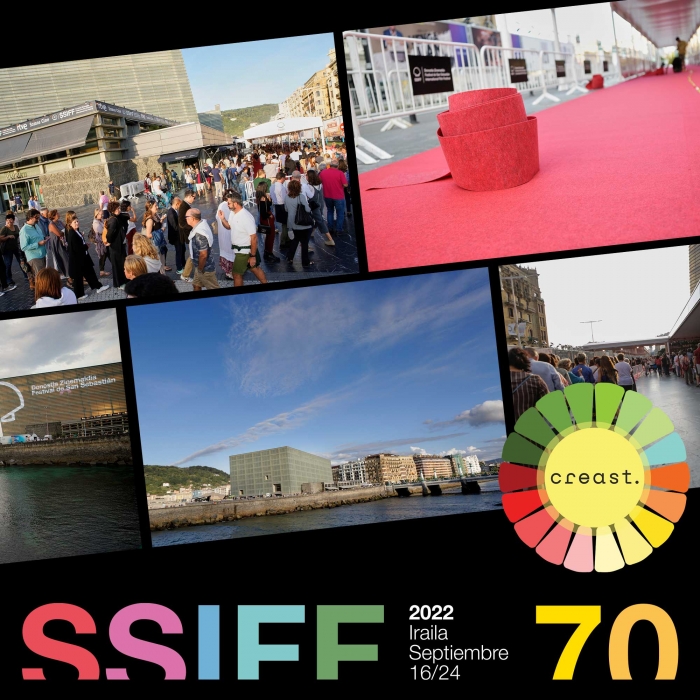The San Sebastian Festival, which this year presented its environmental diagnosis and announced stronger measures to reduce its ecological footprint, continues to take steps to become a carbon-neutral institution and event. The proposals and measures to be promoted in 2022 therefore include the reduction of single-use materials, the offsetting of emissions, the almost total elimination of printing on paper and the organisation of activities related with sustainability.
The report presented last year took as its reference the detailed study of data related to the 2019 edition, concluding that the Festival’s carbon footprint as an institution which works all year round is 1.1 tons of CO2 per day, whilst the 9-day event has an impact of 568.3 tons a day.
In 2022, the Festival has come to an agreement with CREAST, a technology company specialising in environmental consultancy for the audiovisual and entertainment field, under which it will measure the carbon footprint of the 70th edition and create a 5-year plan to make the event more sustainable and carbon-neutral. This would complete the full sustainability cycle (measurement, reduction and offsetting its carbon footprint), applied to all stages of the work in which the Festival has a hand.
Following the analysis carried out on the main areas of CO2eq emissions (energy, mobility, catering, waste, accommodation and water), CREAST estimates that the Festival as a 9-day event will reduce its CO2eq by some 62 tons thanks to the measures already in place. Once the Festival is over, a rigorous measurement will be carried out based on evidence of its carbon footprint, to establish its real impact on the environment and proceed to offset it.

Measures
Last year’s study established that the main problem facing an event such as the Festival is mobility, which constitutes some 75% of its emissions, largely due to the international travel of accredited guests from all over the world. Work is therefore underway on the basis of two concepts: reducing and offsetting.
On the one hand, the Festival has decided to continue reducing, as far as possible, single-use materials, mainly paper, and to do away with services or contracts for which a digital or sustainable alternative exists.
On the other, as announced two months ago, the Festival is the first organisation to have offset its emissions by giving 25,000 euros to the Gipuzkoa Voluntary Carbon Fund launched by the Naturklima Foundation and Gipuzkoa Provincial Council’s Department of the Environment. This contribution will serve to offset 53% of the total emissions generated by the Festival, i.e., 70.21% of those generated by mobility.
As far as waste is concerned, the Festival plans to almost completely eliminate printed paper: the daily will remain in place during the event, as will the book accompanying the retrospective and 6,000 copies of the Film-by-Film guide, but the catalogue will no longer be physically printed and will be distributed in exclusively digital format. Furthermore, for the second year running, the red carpet will be recycled and recyclable, and the Kursaal will have four recycling points for those working at the Festival and accredited guests, while a specific team will supervise waste management at all of the Festival hubs.
With respect to energy, the objective is to finish the work started in 2021 to completely replace all halogen lighting with LED technology in the majority of the Festival’s outdoor setups (last year we achieved 80% and this year we will reach 90%), while in the area of contracts an attempt will be made to use increasingly more locally-sourced caterers thanks to the backing of the Basque Government.

Commitments
Furthermore, as part of the commitments acquired by the Festival, the Nest section will host a masterclass to analyse a practical case of sustainable production based on the experience of Alcarràs (2022), the film by Carla Simón that landed the Golden Bear at the Berlinale and was programmed in the Made in Spain section. The class will be given by Ariadna Dot, the film’s producer at Lastor Media, and by Giovanni Pompili, Head of the Torino Green Lab.
Also, for the second year running, the Festival continues to collaborate with Alba Emission Free Energy, the Petronor subsidy for all energy transition and decarbonisation activities, with a view to promoting the Green Challenge project, focused on taking measures to help mitigate climate change.
Finally, for the first time this year, the Festival and the Basque Government General Secretariat for Social Transition and the 2030 Agenda will give a new award to the film that best respects the values the Sustainable Development Goals (SDGs), while Greenpeace will continue to give the Lurra Award to the Festival film that best reflects the values of defending peace and the environment.






